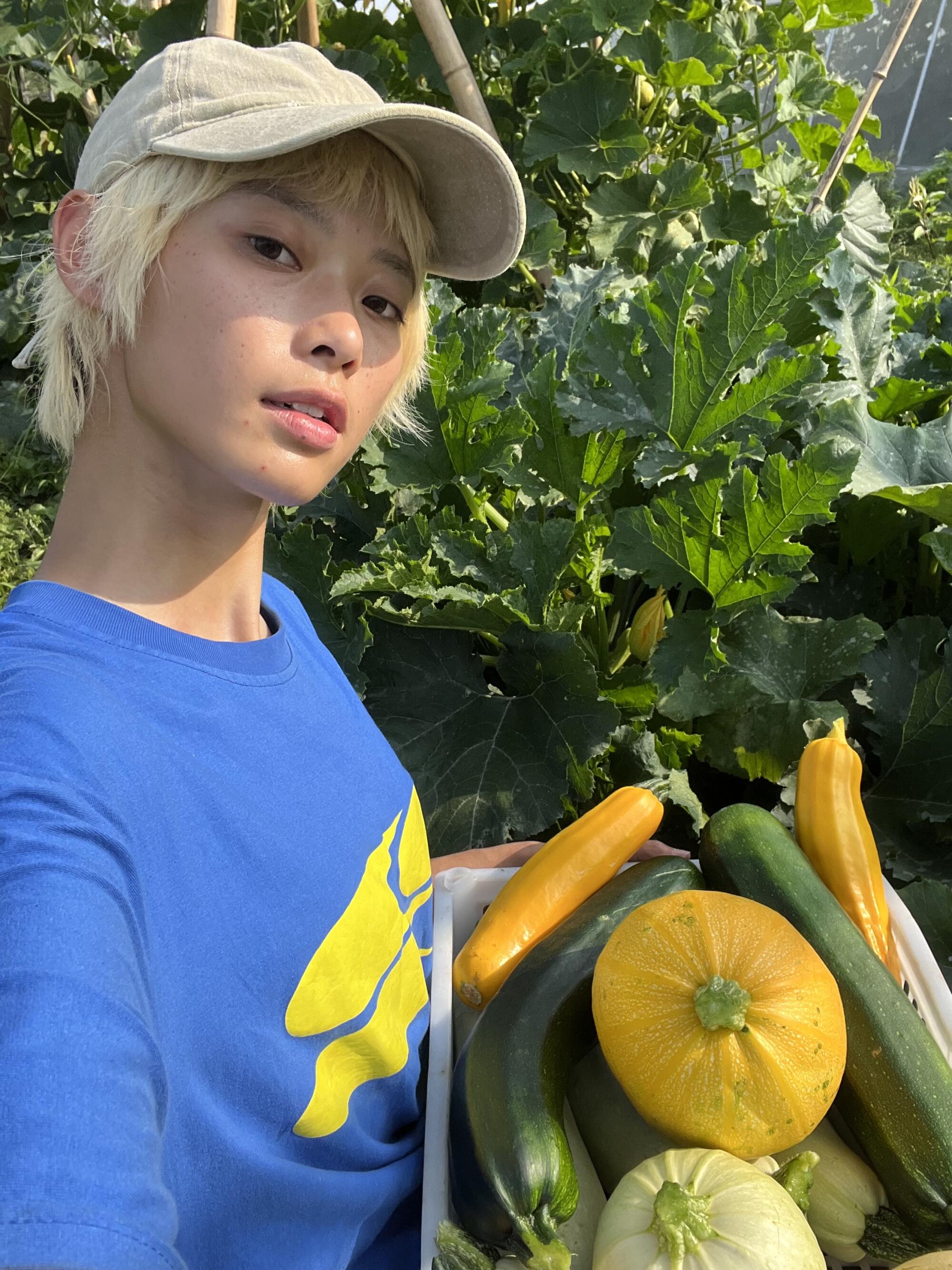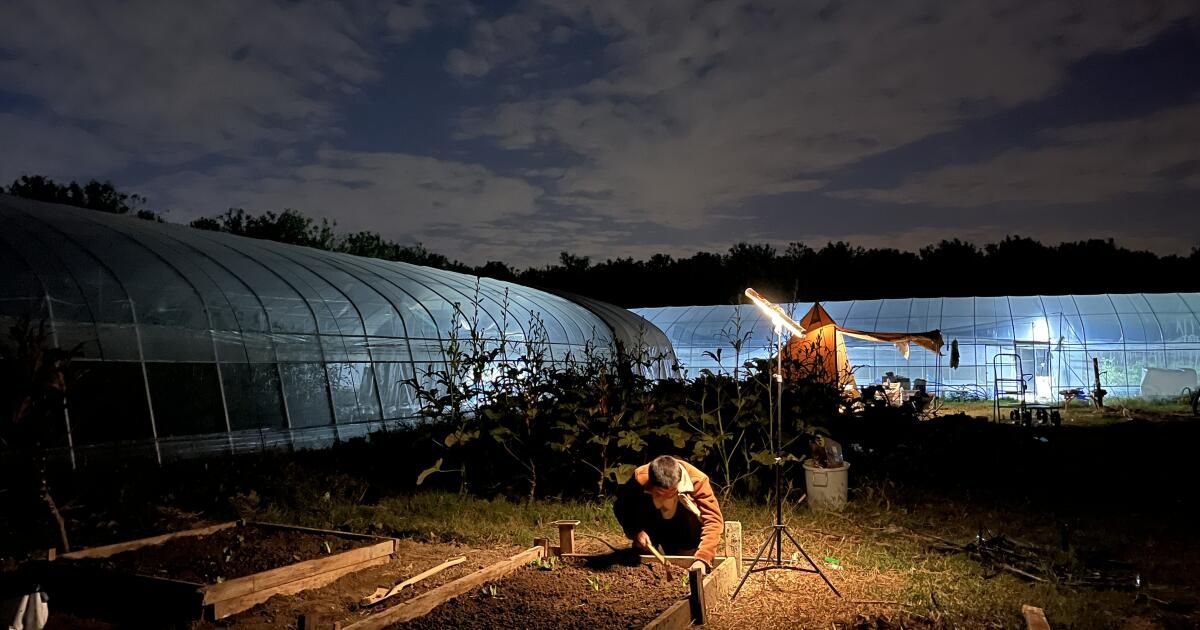Growing up in one of China's largest cities, it never occurred to Liang Yu that he might one day work in the fields.
In college, he majored in television and planned a career in film or advertising.
He began to reconsider after trying to grow tomatoes with other students and discovered that they were sweeter than anything available in stores.
“The first time I ate something I grew myself, I was amazed,” said the 24-year-old from Guangzhou, a city of nearly 19 million people.
Liang Yu grows tomatoes, pumpkins, carrots and other produce at his New Field Farm on the outskirts of Shanghai.
(Courtesy of Liang Yu)
After graduating, she and her boyfriend rented two acres by the hour on the outskirts of Shanghai, set up a greenhouse, and began experimenting with different types of seeds.
They became – in the jargon of their generation – “new farmers.”
For decades, urbanization was a defining feature of the Chinese economic miracle, as people left the countryside for the cities and young people came to see white-collar jobs as a ticket to success.
Now a small but growing number of people are moving in the opposite direction, driven by declining job prospects in cities, government efforts to improve rural areas and the sense that a slower pace of life has its advantages. .
In 2022, a quarter of new university graduates found jobs in cities, towns and small villages, up from a fifth in 2018, according to Chinese higher education consultancy MyCos.
The proportion engaged in agriculture, forestry, livestock or fishing increased from 1.2% to 1.9%. That amounted to more than 200,000 people in 2022.
The government wants those numbers to keep growing. Rural revitalization, a concept introduced by President Xi Jinping in 2017, has become a cornerstone of its national development policy to mitigate income inequality, stimulate local economies and ensure food supplies.
Last year, when urban youth unemployment was over 21%, Xi called on young graduates to return to rural areas to find work and “eat bitterness.” In December, the country passed a food security law aimed at achieving “absolute self-sufficiency” in staple grains. The government has also increased funding to support agricultural businesses.
“Policymakers are going to use every tool at their disposal to make sure China continues to have abundant food at a reasonable price,” said Even Pay, an agricultural analyst at research and advisory firm Trivium China. “Part of that is persuading young people to pursue a career in agriculture.”
It has been difficult to sell it. As the country has become richer, higher education has traditionally offered a way out of hard work and low-paying jobs, such as construction and agriculture.
But growing disillusionment with the status quo among China's middle class may provide the government with an opportunity to persuade some to return to a more traditional life.
“Five or ten years ago it was unthinkable. “Everyone wanted to stay in Beijing or Shanghai,” said Biao Xiang, director of the Max Planck Institute for Social Anthropology and an expert on migration and mobility in China. “We are reaching a tipping point where more and more people are deviating from established social norms.”
One of the most popular reality shows in China this year is an extensive portrait of agricultural life. Now in its second season, “Become a Farmer” features a group of aspiring actors and musicians who work together to manage 74 acres of farmland.
After the first season aired last year, the contestants launched their own production company, which now has 1.8 million followers on Douyin, the original version of TikTok.

Liang Yu shows off the fruits of his labor. She and her boyfriend sell some of her products at local coffee shops.
(Courtesy of Liang Yu)
The local government of Hangzhou, where the show was filmed, gave the group $55 million to expand its operations and encourage ecotourism in the area. The show's producers also began picking up an all-female spinoff series set on a ranch.
An op-ed in the Communist Party's official newspaper praised the series shortly after its debut for educating younger generations about agriculture and encouraging rural revitalization.
“From sowing and watering to fertilizing and harvesting, they are no longer celebrities, but real farmers who depend on nature for their livelihood,” it said. “This affects all viewers and allows the audience to more intuitively understand the importance of food, appreciate food and value life.”
As young workers sought respite from the grind of big cities, many were drawn to the idyllic depiction of the Chinese countryside on social media.
On Xiaohongshu, which translates as “Little Red Book,” a photo and video sharing app, the hashtag “new agricultural project” has garnered more than 300 million views since it was created nearly three years ago. The “new farmer” hashtags, which first appeared in 2018, have been viewed around 95 million times.
Liang and her boyfriend, Carey Wong, use these hashtags to show off their tomatoes, squash, carrots and other products to their more than 20,000 followers. In one video, she holds up a head of cauliflower to show that it is almost as big as her own head. In another, she carries a bunch of green beans through the greenhouse to a pop music soundtrack.
When the couple started learning how to farm three years ago, they relied on video tutorials, e-books, university course materials they found online, and advice from more experienced farmers in specialized chat groups.
Located in Fengjing village, their farm includes a small house where they live. The operation is not large enough to qualify for local grants or subsidies. But they manage to grow enough to cover rent and other bills, selling their produce online and in local coffee shops.
During the harvest season, her days start at 3 a.m. and end at 11 p.m. Her mother was perplexed by Liang's choice of hard labor over a stable office job, though she eventually came around. Friends and followers closer to her age have been intrigued.
“Many of us want to break away from the traditional values that society gives us and choose jobs that the public doesn't necessarily understand,” Liang said. “The new farmers are just a microcosm of this.”

Liang Yu, above, and her boyfriend, Carey Wong, also sell their products online. They use the “new farmer” tag to show their followers what they grow.
(Courtesy of Liang Yu)
Liang and her boyfriend now have their own group chat with more than 400 members, where newbies share photos of green tomatoes and wilted leaves and ask them what they're doing wrong.
A 27-year-old who returned home to work on a tea plantation advised his 5,000 followers not to make the decision lightly.
His Xiaohongshu account, called Countryside Vending Machine, documents the hardships and joys of his job: harvesting with a flashlight at 4 a.m., accidentally knocking over shelves of dried leaves, playing in the snow with his neighbors.
In one video, he presents rural China as a last resort for those who can no longer endure urban life: “Maybe you will find your original self and the courage to start again.”
Yang is a staff writer for The Times and Wu is a special correspondent.












